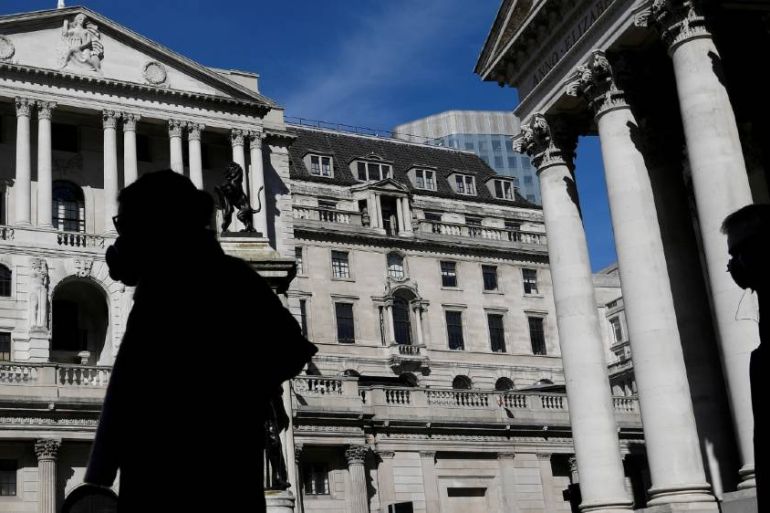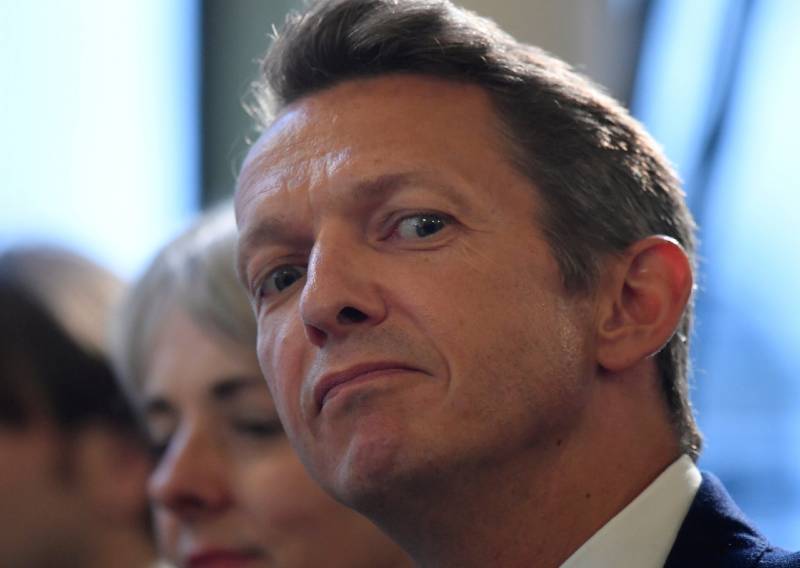The Bank of England might end up paying you to borrow money
UK banks might start charging negative interest rates from next year, top economists are hinting.

A banker, according to the ancient adage, is someone who lends you an umbrella when it’s sunny, and wants it back as soon as it starts to rain.
When you’re in a tough spot, when you need it most, it’s always more difficult to take out a loan than it is when, like Scrooge McDuck, you’re swimming in cash.
Keep reading
list of 3 itemsSurprise! Fed slashes interest rates to counter coronavirus
China slashes one-year interest rates to help virus-hit firms
But imagine a world where banks actually pay you to borrow money from them.
Because it’s a world we might soon be seeing more of.
After interest rates in Japan and parts of Europe turned negative, there is growing speculation that the United Kingdom’s central bank might also resort to cutting borrowing costs below zero to cushion the economy from the coronavirus shutdown.
The Bank of England (BoE) cut rates twice as the COVID-19 crisis escalated in March, and they now stand at a record low of 0.1 percent.
And there’s only one way they’re likely to go, say many top officials.
|
|
Most economists say the bank’s next move will be to add to the firepower of its 645 billion-pound ($787bn) bond-buying programme as soon as June 18, at the end of its next scheduled meeting.
But investors on Monday began to price in the possibility of the BoE overcoming its long-standing reluctance to take rates below zero from the end of 2020 as it contemplates what could be the biggest economic slump in three centuries.
It may not seem exactly intuitive, but many experts see paying people to borrow money as a way to encourage consumers to start spending cash in an economy that desperately needs it.
It’s also hoped that investors would be more willing to invest in potentially money-spinning businesses – rather than let their cash decrease in value while left under the metaphorical mattress.
It started looking more likely in the UK after the BoE’s chief economist, Andy Haldane, said the central bank was looking more urgently at negative interest rates as well as at buying riskier assets.

“The economy is weaker than a year ago and we are now at the effective lower bound, so in that sense it’s something we’ll need to look at – are looking at – with somewhat greater immediacy,” Haldane told the Daily Telegraph newspaper in an interview published late on Saturday.
“How could we not be?”
|
|
On Monday, rate-setter Silvana Tenreyro talked up the benefits of negative rates, citing the experience of other countries in Europe.
“My personal view, which comes from the reading of the European experiences, is that negative rates have had a positive effect in the sense of having a fairly powerful transmission to real activity,” she told a London School of Economics webinar.
The comments from Tenreyro and Haldane, the latter one of the BoE’s most outspoken policymakers, struck a more urgent note than the message from BoE Governor Andrew Bailey.
Last week, Bailey said taking rates below zero “is not something we are currently planning for or contemplating”, but he added it was not wise to rule anything out.
Allan Monks, an economist with JP Morgan, said the comments, along with BoE Deputy Governor Ben Broadbent’s saying on May 12 that the BoE needed to keep on weighing up the pros and cons of negative rates, suggested the central bank was reviewing its stance.
“Despite the mixed messaging, it appears the MPC [Monetary Policy Committee] believes this is a debate which is at least worth revisiting,” Monks said in an email to clients.
The departure in March of previous BoE Governor Mark Carney, who was particularly resistant to going negative, might have created space for fresh discussions, he said.
|
|
While the European Central Bank and the Bank of Japan have cut their benchmark rates below zero in a bid to get banks to turn their cash into loans and boost economic growth, the BoE has said it believes such a move would be counterproductive, because it would hurt banks and make them less likely to lend.
But investors have not missed the apparent willingness to contemplate the question anew.
Rob Wood, an economist with BofA Global Research, said the brevity of the recent comments allowed for misunderstandings, but the BoE seemed to be signalling that 0.1 percent was no longer the floor for rates, and a cut to zero was possible in August.
“We think a policy rate of zero rate is easier for the BoE to contemplate and they will need to exhaust other options, which will take time, before taking rates negative,” Wood said.
Going below zero would further weaken sterling, which is already touching two-month lows against the dollar and the euro because of the prospect of failure in London’s post-Brexit trade talks with Brussels.
But saying never to sub-zero borrowing costs no longer made sense, Wood said.
“We see the probability of negative rates higher for 2021 than 2020,” he said. “We can’t rule it out anymore.”